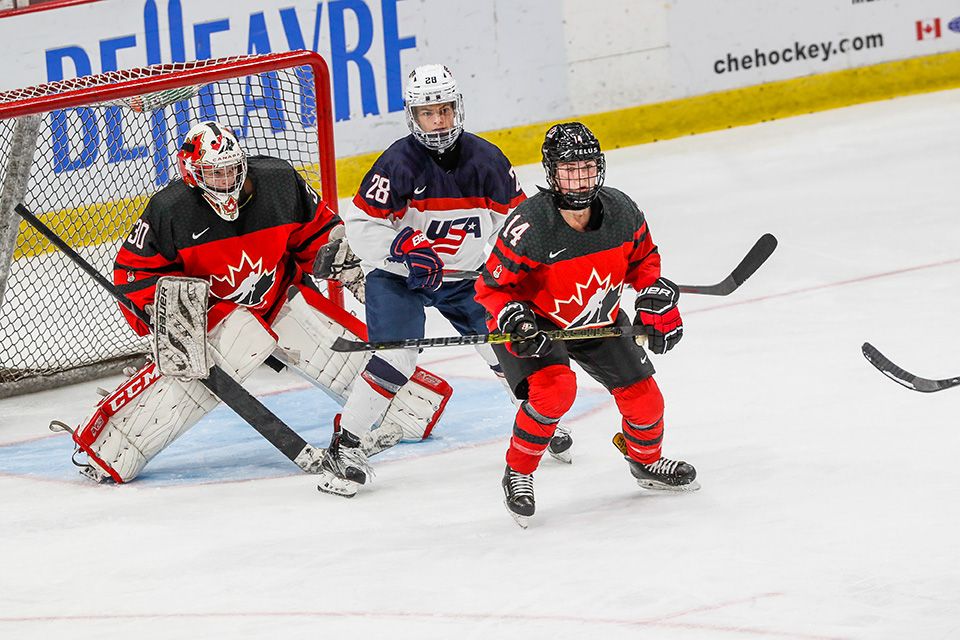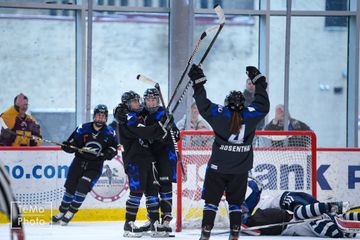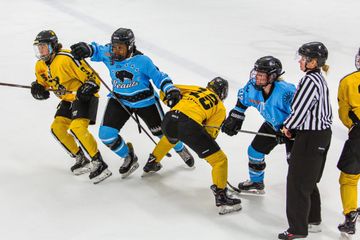Ashley Messier can pinpoint the moment she knew she wanted to play for her country. It was February of 2014, and her elementary school class in Wilcox, Saskatchewan, had set aside coursework to watch the gold medal game play out in Sochi.
"It was the Olympics where Canada was down by two goals with like, not much time left in the game, and they came back and won," she recalls with enthusiasm.
Next week, she'll take the first big step towards her own Olympic dream as she suits up for Team Canada at the U18 Women's World Championship in Bratislava, Slovakia. But it almost didn't pan out that way. Messier's journey to U18 Worlds initially took her south of the border, and for a while she was donning the red, white, and blue.
A dual citizen whose mom grew up in Flint, Michigan, Messier watched from home last year after finding out late in the process that she was ineligible to represent Team USA in international competition, on account of not having played club hockey in the country. She'd made the American team for the three-game Summer Series in Calgary just months prior, and had been in the running for the final squad before learning of the technicality. To have gone through the full try-out process and been so close to achieving her goal of making it to U18 Worlds, only to have it quashed by a rule she didn't know existed, was crushing.
That in itself is a twist in the story, given that her initial forays into the USA Hockey program weren't with the national team in mind. At first, making the seven-hour drive from Wilcox to Grand Forks, North Dakota, for the annual state try-out, which is open to any U.S. citizen, was mostly just a way to get some extra ice time. "My dad thought it would be cool to see what hockey's like in the U.S., just to kind of broaden my knowledge of the game," she explains. Her family didn't really know much about the process, but local scouts were impressed by the young defender and invited her to the next try-out in the series. One camp led to another, and eventually Messier found herself at the 2017 Girls 15 national development camp in St. Cloud, Minnesota. She returned to Grand Forks the next year, just for fun, and says she was surprised to make it all the way to the U18 Select Camp in Lake Placid, reserved for the top 70 players in the country. From there, she was chosen for the 22-player Summer Series roster and was suddenly within reach of a dream she'd had for years ― albeit in a somewhat different form.
"Honestly, it's the best feeling in the world," she says of finally making it to the international stage after last year's setback. "It's a dream come true. As a young player in women's hockey, the national team is kind of what you shoot for. It's just an amazing feeling of work paying off and knowing that you get to have such a great experience and grow your game that much more."
She describes last winter as having been a rough time for her given the disappointment of missing out on 2019 Worlds, but with the benefit of hindsight, Messier is choosing to believe that everything happens for a reason. Playing for Canada "just really feels right," she says ― "it feels like home." And it was her ultimate goal growing up. She would've been honoured to represent Team USA and is grateful to have had the opportunity to be part of their program. But that Olympic final in 2014? She was "absolutely" cheering for Canada.
The fact that participating in an IIHF-sanctioned tournament would've more or less locked in her national team affiliation had crossed her mind in 2018, but she wasn't likely to pass up the opportunity with Team USA if it came. After all, she hadn't even been invited to the Canadian camps that year. "If I would have been able to go to Worlds, in all honesty, it probably would have happened. I probably would have and I would have ended up there," she acknowledges. "Now with Canada, knowing that this is where I'll be staying, I have no problems with that at all. I'm very grateful that this is going to be my team to play with."
As a kid, Messier had plenty of opportunities to hone her talent. Her dad, grandpa, and uncle ran a hockey school in Banff in the summers, where she was able to access top-tier training from an early age. She spent her winters on the backyard rink in their hometown of Canmore, Alberta, nestled in the Rocky Mountains.
"I could stay in the dorms and be on the ice, as young as the age of five years old, with everyone all the time. So that definitely was amazing for me," she says of the hockey school, where she tagged along while her dad worked. "It was a great way to get me to love hockey, to be around my family and a bunch of other kids just having a lot of fun."
Her dad also coached her minor hockey squads from the time she picked up the sport at age five until she transferred from co-ed to girls' hockey as a teen. Having him behind the bench pushed her to constantly improve, she explains: "He knew what he could get out of me better than anybody else." Messier spent those early years as a forward; she jokes that at barely five feet tall and 110 pounds, playing defense in a full-contact league probably wouldn't have been the best move. She made the switch to the blue line after joining an all-girls association in 2016, and quickly excelled in her new role thanks to an early emphasis on developing strong skating skills.
That smooth stride is a highlight of her game, which has been garnering plenty of accolades lately. Messier is the two-time reigning Top Defenceman at the Esso Cup, Canada's U18 club nationals. She competed at the Canada Winter Games this past spring, and last month was named tournament MVP as she captained Saskatchewan to its first-ever medal, a silver, at the U18 national championship.
"It's not that everyone expected our team this year to be the most skilled, most talented, best team Sask has ever seen, because there's been a lot of great players in the past on teams that haven't done very well," she says of the history-making performance. "But I think with us, it came down to everyone who was there had the right mindset. We were all there to work hard, work as a team, and do everything we could to get that medal and to place as highly as we could. So I think, really, it came down to the players playing as a team and thinking, Yeah, we're gonna do this."
As for her personal successes, Messier credits those in large part to her mindset of ensuring that every play she makes is with purpose. Each time the puck touches her stick, the 17-year-old strives to make sure that when it leaves, it doesn't go to the other team, and instead actively serves to benefit her own. It comes down to thinking the game a step or two ahead, and knowing what she wants to have happen before she makes a move.
That's not unlike her off-ice philosophy, which led her to relocate to Rochester, New York, to join Selects Academy at Bishop Kearney this year. She'd spent the past three seasons with the Saskatoon Stars, but with a coaching change looming, she figured the time was right to switch things up. Messier compares the decision to her choice to attend those first USA Hockey camps early on, rooted in exposing herself to different styles in order to become a more well-rounded player.
"It was just kind of a different way to see how I could grow my game," she explains. "Let's try and play in a different league against other top teams. I had played against a lot of the top teams in Canada, and I thought it'd be very beneficial to train with some of the best players in the U.S., as well as play against them."
In Saskatoon, Messier lived with a billet family. At Selects she stays in the dorms, where she's surrounded 24/7 by fellow athletes, all of whom are working towards the same goals. Three of her teammates will be representing Team USA in Slovakia, and training alongside them on and off the ice has provided both camaraderie and a source of constant motivation.
"You can see all the behind the scenes as you're living with all these girls, and it's every day pushing you to be your best," she notes. "And you see the work that comes into the U.S. girls on Team USA, as well as knowing what's going on in the weight room, on the ice ― everything. It's just really cool to be able to see and compare and push yourself with everyone here."
Next year, Messier will be heading to Cornell University, keeping with the school's strong tradition of developing top Canadian defenders. It's a school that she considers to be a perfect fit, between the successful hockey program and the Ivy League education, which is something she's wanted since she was a kid. She takes a lot of pride in her studies, and is well aware of the long-term benefits that a high-quality education can offer. And while Messier is hoping for a lengthy career in the game and plans to stay involved long after her playing days are over, she's also well aware of the unfortunate reality that opportunities in women's hockey aren't particularly lucrative.
"As important as hockey is to me, and it definitely is my driving force for a lot of the things I do, I know that it's not going to be 'til the day I die," she acknowledges. Messier's been keeping an eye on the women's hockey landscape and would love to see a strong professional league in place by the time she graduates university. "I would really hope that it is, obviously, a reality," she says first and foremost, noting the frustrating state of affairs that post-collegiate players currently confront.
"I really hope that they push through, as they have been," she continues. "And when I get there, if it's not quite where it needs to be, I hope that I can do the same to try and make it better for the younger generations with hockey, because I think it's really important that women have a chance to compete at a high level like the men do. I know it's not reasonable to think of it as the NHL in the next five years. But I hope at some point in my lifetime, or my grandchildren's lifetime, that that is a reality, that they can play and get paid to play and make their life out of it."
(Photo credit: Nancie Battaglia/USA Hockey)



